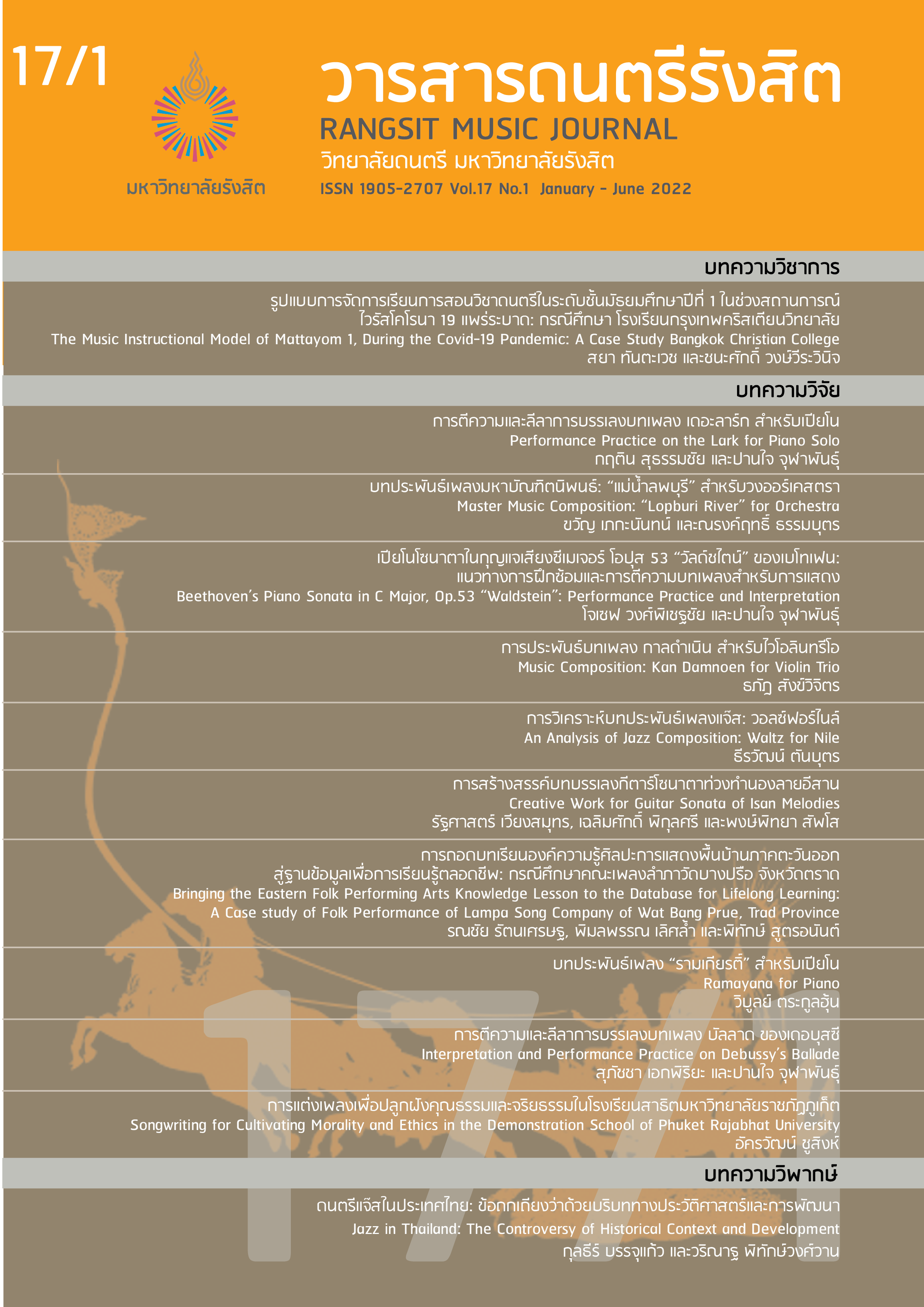Bringing the Eastern Folk Performing Arts Knowledge Lesson to the Database for Lifelong Learning: A Case study of Folk Performance of Lampa Song Company of Wat Bang Prue, Trad Province
Keywords:
Knowledge Lesson, Lampa Song, Eastern Folk PerformingAbstract
The purposes of this qualitative research were to build a database of the history of community’s development and lifestyle, including history, community’s lifestyle and linkage and to gather knowledge of folk performance: A Case study of folk performance of Lampa song Company of Wat Bang Prue, Trad Province. The results revealed that;
Case study: folk performance of Lampa song company of Wat Bang Prue, showed that there were Lampa song company of each temple to play Lampa song’s performance in Huai Rang district. The duty of Lampa song companies was to request the donation from people for making merit at the temple in the village during Songkran festival. The Lampa song company of Wat Bang Prue played on April 14 in every year. They walked and sang for donation from 6.00 PM of April 14 till 6.00 AM of April 15. Everything was brought to make merit for carrying sand to the temple. Therefore, the Lampa song’s folk performance was the linkage between community and lifestyle to maintain Buddhist mission by the volunteers who established and inherited to the next generation till now. However, the knowledge of singing was not inherited seriously, it was inherited in the way of participation and remembering the method. The song was divided into 3 parts; singing for warning, singing for request and singing for saying goodbye and blessing. The Lampa song company of Wat Bang Prue has still inherited the song in Songkran festival till present.
References
กมลวรรณ บุญสุทธิ์. “วิถีวัฒนธรรมของชาวตราด." ใน ปกิณกศิลปวัฒนธรรม เล่ม 19 จังหวัดตราด, กรมศิลปากร, บรรณาธิการ, 88-111. กรุงเทพฯ: บริษัท ฤทธี ครีเอชั่น จำกัด, 2556.
กระทรวงศึกษาธิการ, และกระทรวงมหาดไทย. วัฒนธรรม พัฒนาการทางประวัติศาสตร์ เอกลักษณ์และภูมิปัญญา จังหวัดตราด. กรุงเทพฯ: โรงพิมพ์ครุสภาลาดพร้าว, 2542.
จามร พงษ์ไพบูลย์. “กระบวนการเรียนรู้และสืบทอดภูมิปัญญาท้องถิ่น: กรณีศึกษา “เพลงโหงฟาง” ของจังหวัดตราด.” รายงานงานวิจัย, กระทรวงวัฒนธรรม, สำนักงานคณะกรรมการวัฒนธรรมแห่งชาติ, 2550.
ฉัตราภรณ์ จินดาเดช. “เทศกาลและงานประเพณีจังหวัดตราด." ใน ปกิณกศิลปวัฒนธรรม เล่ม 19 จังหวัดตราด, กรมศิลปากร, บรรณาธิการ, 112-130. กรุงเทพฯ: บริษัท ฤทธี ครีเอชั่น จำกัด, 2556.
ฉวี สมสู่. ผู้แสดงในคณะเพลงลำภาวัดหนองปรือ (ผู้ให้สัมภาษณ์). เมื่อวันที่ 28 สิงหาคม 2564.
ทวีวัฒน์ ระลึกชอบ, กำนัน. ประธานศิลปินพื้นบ้าน จังหวัดตราด (ผู้ให้สัมภาษณ์). เมื่อวันที่ 28 สิงหาคม 2564.
นิกร ห่วนกิ่ม. หัวหน้าคณะเพลงลำภาวัดหนองปรือ (ผู้ให้สัมภาษณ์). เมื่อวันที่ 28 สิงหาคม 2564.
บันญัติ แจ้สมบูรณ์. ผู้แสดงในคณะเพลงลำภาวัดหนองปรือ (ผู้ให้สัมภาษณ์). เมื่อวันที่ 28 สิงหาคม 2564.
ประชิด สกุณะพัฒน์. วัฒนธรรพื้นบ้านและประเพณีไทย. กรุงเทพฯ: ภูมิปัญญา, 2546.
ประพนธ์ ผาสุกยืด. การจัดการความรู้ ฉบับมือใหม่หัดขับ. กรุงเทพฯ: สำนักพิมพ์ไยไหม, 2547.
ฟ้ามุ้ย ศรีบัว. “เพลงขอทาน ครูประทีป สุขโสภา.” วิทยานิพนธ์ปริญญาศิลปศาสตรมหาบัณฑิต,มหาวิทยาลัยนเรศวร, 2555.
ศรีจันทร์ น้อยสอาด. “เพลงร้องพื้นบ้านในพื้นที่จังหวัดปทุมธานี กรณีศึกษา: เพลงโนเน เพลงลำภาข้าวสาร และเพลงระบำพื้นบ้าน.” วิทยานิพนธ์ปริญญาศิลปศาสตรมหาบัณฑิต, มหาวิทยาลัยมหิดล, 2544.
อภิลักษณ์ เกษมผลกูล. “เพลงบอกบุญ จังหวัดตราด: กลวิธีโน้มน้าวใจและบทบาทต่อสังคม.” วิทยานิพนธ์ปริญญาอักษรศาสตรมหาบัณฑิต, จุฬาลงกรณ์มหาวิทยาลัย, 2547.
Downloads
Published
How to Cite
Issue
Section
License
Copyright (c) 2022 Rangsit Music Journal

This work is licensed under a Creative Commons Attribution-NonCommercial-NoDerivatives 4.0 International License.







